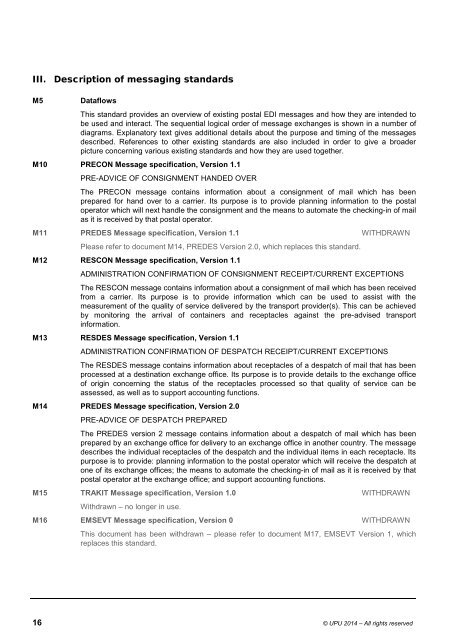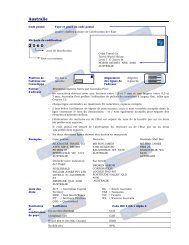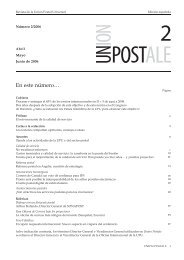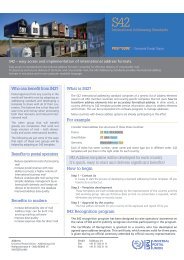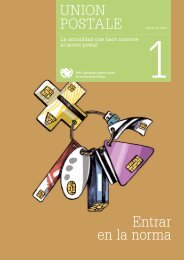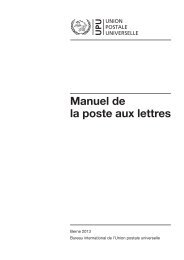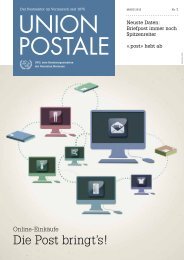Catalogue of UPU Standards - Universal Postal Union
Catalogue of UPU Standards - Universal Postal Union
Catalogue of UPU Standards - Universal Postal Union
Create successful ePaper yourself
Turn your PDF publications into a flip-book with our unique Google optimized e-Paper software.
III. Description <strong>of</strong> messaging standards<br />
M5<br />
Dataflows<br />
This standard provides an overview <strong>of</strong> existing postal EDI messages and how they are intended to<br />
be used and interact. The sequential logical order <strong>of</strong> message exchanges is shown in a number <strong>of</strong><br />
diagrams. Explanatory text gives additional details about the purpose and timing <strong>of</strong> the messages<br />
described. References to other existing standards are also included in order to give a broader<br />
picture concerning various existing standards and how they are used together.<br />
M10 PRECON Message specification, Version 1.1<br />
PRE-ADVICE OF CONSIGNMENT HANDED OVER<br />
The PRECON message contains information about a consignment <strong>of</strong> mail which has been<br />
prepared for hand over to a carrier. Its purpose is to provide planning information to the postal<br />
operator which will next handle the consignment and the means to automate the checking-in <strong>of</strong> mail<br />
as it is received by that postal operator.<br />
M11 PREDES Message specification, Version 1.1 WITHDRAWN<br />
Please refer to document M14, PREDES Version 2.0, which replaces this standard.<br />
M12 RESCON Message specification, Version 1.1<br />
ADMINISTRATION CONFIRMATION OF CONSIGNMENT RECEIPT/CURRENT EXCEPTIONS<br />
The RESCON message contains information about a consignment <strong>of</strong> mail which has been received<br />
from a carrier. Its purpose is to provide information which can be used to assist with the<br />
measurement <strong>of</strong> the quality <strong>of</strong> service delivered by the transport provider(s). This can be achieved<br />
by monitoring the arrival <strong>of</strong> containers and receptacles against the pre-advised transport<br />
information.<br />
M13 RESDES Message specification, Version 1.1<br />
ADMINISTRATION CONFIRMATION OF DESPATCH RECEIPT/CURRENT EXCEPTIONS<br />
The RESDES message contains information about receptacles <strong>of</strong> a despatch <strong>of</strong> mail that has been<br />
processed at a destination exchange <strong>of</strong>fice. Its purpose is to provide details to the exchange <strong>of</strong>fice<br />
<strong>of</strong> origin concerning the status <strong>of</strong> the receptacles processed so that quality <strong>of</strong> service can be<br />
assessed, as well as to support accounting functions.<br />
M14 PREDES Message specification, Version 2.0<br />
PRE-ADVICE OF DESPATCH PREPARED<br />
The PREDES version 2 message contains information about a despatch <strong>of</strong> mail which has been<br />
prepared by an exchange <strong>of</strong>fice for delivery to an exchange <strong>of</strong>fice in another country. The message<br />
describes the individual receptacles <strong>of</strong> the despatch and the individual items in each receptacle. Its<br />
purpose is to provide: planning information to the postal operator which will receive the despatch at<br />
one <strong>of</strong> its exchange <strong>of</strong>fices; the means to automate the checking-in <strong>of</strong> mail as it is received by that<br />
postal operator at the exchange <strong>of</strong>fice; and support accounting functions.<br />
M15 TRAKIT Message specification, Version 1.0 WITHDRAWN<br />
Withdrawn – no longer in use.<br />
M16 EMSEVT Message specification, Version 0 WITHDRAWN<br />
This document has been withdrawn – please refer to document M17, EMSEVT Version 1, which<br />
replaces this standard.<br />
16 © <strong>UPU</strong> 2014 – All rights reserved


